The project “Strengthening transparency and accountability for gender equality in Western Balkans and Moldova (Gender Budget Watchdog Network, Phase II)” is being implemented by a team of 7 coordinators, one learning officer and assistant, supported by team of financial manager and officers, one in each country and steered by a regional director through weekly online meetings.
 Marija Risteska holds a PhD in political science, has experience in teaching public policy and has worked in a capacity of policy researcher, analyst and adviser of central and local level government since 2006. Risteska has written textbook: “Public policy, policy making and public value (2017)”. Her specialization is in gender mainstreaming in policy, budgets and projects. Her capacity has been built by UNWOMEN, but Risteska worked as gender consultant for ILO, EC, OSCE, UNDP, COE and GIZ/FAO. Risteska developed capacity building programs and delivered mentoring in gender responsive budgeting to central and local level government officials and civil society organizations. Marija contributed to the IMF Vienna institute GRB course and is a co-author of the Textbook for Universities “Gender Responsive Budgeting (2013). Currently Risteska is acting as Regional Director of the Gender Budget Watchdog Network of CSOs from Albania, Bosnia and Herzegovina, Montenegro, North Macedonia, Kosovo, Serbia and Moldova; and works as an International Gender expert on the Women in Government initiative of USAID in Eastern Ukraine. Marija Risteska has authored numerous policy studies and documents such as Strategies and programs that apply or are developed based on gender mainstreaming methodologies. Marija acts as the Program Director or the Gender Budget Watchdog Network.
Marija Risteska holds a PhD in political science, has experience in teaching public policy and has worked in a capacity of policy researcher, analyst and adviser of central and local level government since 2006. Risteska has written textbook: “Public policy, policy making and public value (2017)”. Her specialization is in gender mainstreaming in policy, budgets and projects. Her capacity has been built by UNWOMEN, but Risteska worked as gender consultant for ILO, EC, OSCE, UNDP, COE and GIZ/FAO. Risteska developed capacity building programs and delivered mentoring in gender responsive budgeting to central and local level government officials and civil society organizations. Marija contributed to the IMF Vienna institute GRB course and is a co-author of the Textbook for Universities “Gender Responsive Budgeting (2013). Currently Risteska is acting as Regional Director of the Gender Budget Watchdog Network of CSOs from Albania, Bosnia and Herzegovina, Montenegro, North Macedonia, Kosovo, Serbia and Moldova; and works as an International Gender expert on the Women in Government initiative of USAID in Eastern Ukraine. Marija Risteska has authored numerous policy studies and documents such as Strategies and programs that apply or are developed based on gender mainstreaming methodologies. Marija acts as the Program Director or the Gender Budget Watchdog Network.

Visnja Bacanovic (MA in sociology) works as a gender mainstreaming expert for more than 10 years, in Serbia and Western Balkans region. She is specialised in gender mainstreaming and gender responsive budgeting and she worked in various programmes and projects that included: capacity building for different actors (NGOs, public servants, mechanisms for gender equality), development of e – learning courses for civil servants, preparation of comprehensive training manual for gender equality mechanism at the local level, conducting gender infrastructure assessment and providing support for its improvement, gender analysis in different sectors. Visnja worked on development of gender equality policies, both at the local and national level and gender mainstreaming of public policies in various sectors, including gender mainstreaming in IPA programming in Serbia. She is author and co – author of papers, guidelines, tools and reports related to gender equality mechanisms and gender mainstreaming capacities, gender and environment, emergency response and management. Within the Women’s Platform for Development of Serbia, Visnja is very active in advocacy for gender responsive policies in Serbia and policies appraisals based on dialogue within the women’s movement and grassroots knowledge production.
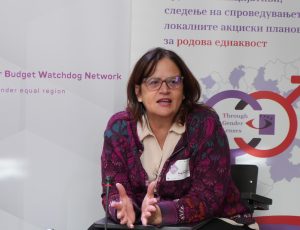 Mirela Arqimandriti has more than 20 years’ experience in the field of women’s rights, gender-based violence and advancement of gender equality in Albanian society. As gender expert and director of Gender Alliance for Development Centre she implemented dozens of projects and organized many activities dedicated to gender-based violence, women’s labour rights, gender responsive budgeting, gender mainstreaming and analysis. Mirela is a researcher and gender analyst, with significant contribution to the establishment of the Community Coordinated Response (CCR) against Domestic Violence in 5 municipalities in Albania. She also has developed a monitoring methodology of the Strategic Objective 3 dedicated to the fight against Gender Based Violence of the National Strategy for Gender Equality 2016-2020 in Albania, monitoring through 9 municipalities and published reports of monitoring for the public and other stakeholders. She is trainer of feminist and gender equality and coach of many women’s rights organizations. She has developed different sectoral based gender analysis, analysed gender dimensions, promoted and protected women rights in the labour market through research, awareness rising, capacity building activities, networking, lobbying and advocacy. In addition to the women’s labour rights she is developing a methodology to improve women’s position in the labour market through empowering a group of girls and women working in shoes and textile industry (fasoneria) from urban and peri urban areas in eight municipalities, with knowledge on rights in the labour market through providing training and know-how on access to labour market, Labour Code and gender-based discrimination. She is co-founder of 3 civil society organizations which are acting as networks for women’s empowerment (AWEN), for monitoring the local life of men and women and municipality accountability (POP) and for free and fair elections and gender quota (KZLN). All three with a successful track of projects implementation. She is the gender analyst of the European Union Technical Assistance for the Gender Equality Agenda in Albania and gender consultant near the Council of Europe for gender mainstreaming and training development. Mirela is the author of different gender sectoral analysis. She applies a statistical based approach in different research studies to support findings and recommendations during the monitoring of the implementation of gender equality legal framework in Albania and the functioning of gender machinery. In regards to the recent studies, she is co-author of the manual “How to Respond to Domestic Violence with a special focus to the Albanian State Police, Intimate Partner Violence in Adolescence in Albania, Gender Based Discrimination and Labour in Albania, Monitoring Primary Health Care Centres in 5 municipalities, in Albania. She is a feminist, women’s rights activist and the founder of the first feminist library in Albania in 2015, with 2.000 titles of international feminist books. She is continuing the PhD degree on Family and Community Studies and has a master degree in Gender, Poverty and Employment and a master degree in Business Administration.
Mirela Arqimandriti has more than 20 years’ experience in the field of women’s rights, gender-based violence and advancement of gender equality in Albanian society. As gender expert and director of Gender Alliance for Development Centre she implemented dozens of projects and organized many activities dedicated to gender-based violence, women’s labour rights, gender responsive budgeting, gender mainstreaming and analysis. Mirela is a researcher and gender analyst, with significant contribution to the establishment of the Community Coordinated Response (CCR) against Domestic Violence in 5 municipalities in Albania. She also has developed a monitoring methodology of the Strategic Objective 3 dedicated to the fight against Gender Based Violence of the National Strategy for Gender Equality 2016-2020 in Albania, monitoring through 9 municipalities and published reports of monitoring for the public and other stakeholders. She is trainer of feminist and gender equality and coach of many women’s rights organizations. She has developed different sectoral based gender analysis, analysed gender dimensions, promoted and protected women rights in the labour market through research, awareness rising, capacity building activities, networking, lobbying and advocacy. In addition to the women’s labour rights she is developing a methodology to improve women’s position in the labour market through empowering a group of girls and women working in shoes and textile industry (fasoneria) from urban and peri urban areas in eight municipalities, with knowledge on rights in the labour market through providing training and know-how on access to labour market, Labour Code and gender-based discrimination. She is co-founder of 3 civil society organizations which are acting as networks for women’s empowerment (AWEN), for monitoring the local life of men and women and municipality accountability (POP) and for free and fair elections and gender quota (KZLN). All three with a successful track of projects implementation. She is the gender analyst of the European Union Technical Assistance for the Gender Equality Agenda in Albania and gender consultant near the Council of Europe for gender mainstreaming and training development. Mirela is the author of different gender sectoral analysis. She applies a statistical based approach in different research studies to support findings and recommendations during the monitoring of the implementation of gender equality legal framework in Albania and the functioning of gender machinery. In regards to the recent studies, she is co-author of the manual “How to Respond to Domestic Violence with a special focus to the Albanian State Police, Intimate Partner Violence in Adolescence in Albania, Gender Based Discrimination and Labour in Albania, Monitoring Primary Health Care Centres in 5 municipalities, in Albania. She is a feminist, women’s rights activist and the founder of the first feminist library in Albania in 2015, with 2.000 titles of international feminist books. She is continuing the PhD degree on Family and Community Studies and has a master degree in Gender, Poverty and Employment and a master degree in Business Administration.
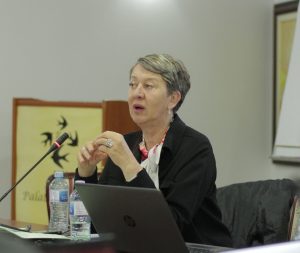 Slavica Striković has graduated with a degree from the Electro- technical faculty on University of Montenegro and holds MA on Gender Studies, from the Faculty of Humanities, University of Donja Gorica. she was part of the WNGO Women Action until its establishing, since 2000, where now she is an executive director. She is certificated trainer in: Gender Budgeting, organized by UNIFEM; Trainers and communication skills, organized by Norwegian Peoples Aid; Gender Studies, organized by Ministry of Justice, Montenegro; Citizen participation in decision making process, organized by EU; and Managing of EU projects, organized by DEU in Sarajevo. She has multiyear organizing experience in international conferences, seminars, educational meetings, public presentations of publications, magazines and documents on Gender and other issues; complex sociological and statistic researches on women’s population in Montenegro, etc. Her professional membership is consisted of:
Slavica Striković has graduated with a degree from the Electro- technical faculty on University of Montenegro and holds MA on Gender Studies, from the Faculty of Humanities, University of Donja Gorica. she was part of the WNGO Women Action until its establishing, since 2000, where now she is an executive director. She is certificated trainer in: Gender Budgeting, organized by UNIFEM; Trainers and communication skills, organized by Norwegian Peoples Aid; Gender Studies, organized by Ministry of Justice, Montenegro; Citizen participation in decision making process, organized by EU; and Managing of EU projects, organized by DEU in Sarajevo. She has multiyear organizing experience in international conferences, seminars, educational meetings, public presentations of publications, magazines and documents on Gender and other issues; complex sociological and statistic researches on women’s population in Montenegro, etc. Her professional membership is consisted of:
– 2006- 2019: President of Board for Women Enterprising within Economy Chamber of Montenegro
– 2008- still: Member of Regional Women Lobby
– 2009-2014: Member of Council of Public service Radio Television Montenegro
– 2013- still: Member of Managing board of Pedagogical Center of Montenegro
– 2015- 2019: Member of UN Women Civil Society Advisory Group for Europe and Central Asia
– 2014- 2017: Member of Commission for the allocation of a portion of the proceeds of gambling within Ministry of Finance
– 2018- 2019: Member of Commission for granting of NGOs within Ministry of Culture
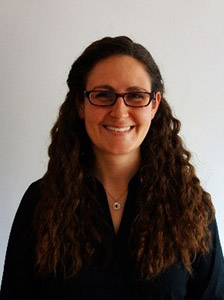 Nicole Farnsworth, a U.S. and a Kosovo citizen, she has lived and worked in Kosovo for 17 years, primarily with the Kosovo Women’s Network (KWN) where she presently serves as Program Director and Lead Researcher. A sociologist researcher (MSc, London School of Economics), writer, and gender equality activist, she has led research and (co)authored 24 publications on gender equality, gender-responsive budgeting, gender-based violence, and integrating a gender perspective in the EU Accession process. Several have influenced legal and policy changes. She has provided dozens of trainings and tailored mentoring to government organisations at local and central levels in Kosovo, supporting them in introducing gender-responsive budgeting. She also has supported the Ministry of Finance in designing guidance in budget circulars for gender-responsive budgeting, as well as created curricula on this theme for the Kosovo Institute for Public Administration. Since 2016, she has served as Team Leader, advising the EU Office in Kosovo in gender analysis, gender mainstreaming of EU programming and implementation of the EU Gender Action Plan II. Nicole also consults regularly, worldwide, for various international organizations on gender analysis, gender mainstreaming, advocacy techniques, and civil society support.
Nicole Farnsworth, a U.S. and a Kosovo citizen, she has lived and worked in Kosovo for 17 years, primarily with the Kosovo Women’s Network (KWN) where she presently serves as Program Director and Lead Researcher. A sociologist researcher (MSc, London School of Economics), writer, and gender equality activist, she has led research and (co)authored 24 publications on gender equality, gender-responsive budgeting, gender-based violence, and integrating a gender perspective in the EU Accession process. Several have influenced legal and policy changes. She has provided dozens of trainings and tailored mentoring to government organisations at local and central levels in Kosovo, supporting them in introducing gender-responsive budgeting. She also has supported the Ministry of Finance in designing guidance in budget circulars for gender-responsive budgeting, as well as created curricula on this theme for the Kosovo Institute for Public Administration. Since 2016, she has served as Team Leader, advising the EU Office in Kosovo in gender analysis, gender mainstreaming of EU programming and implementation of the EU Gender Action Plan II. Nicole also consults regularly, worldwide, for various international organizations on gender analysis, gender mainstreaming, advocacy techniques, and civil society support.
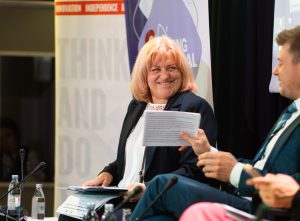 Ludmila Malcoci, Professor Researcher, Ph.D. habilitate in social sciences, Keystone Human Services International Regional Director for Eastern and Central Europe, and Keystone Moldova Executive Director is working with Keystone Human Services for more than fourteen years. Under her outstanding leadership, Keystone Moldova became one of the main promoters of the social inclusion of persons with intellectual disabilities and mental health in Moldova and in the region. Mrs. Malcoci is a high qualified specialist with more than 20 years of international development expertise in various countries, including Moldova, Russia, Turkey, Ukraine, Romania, Belorussia and Kazakhstan. She worked for different international organizations, like World Bank, USAID, UNICEF, UNDP, Soros-Foundation, EU, etc. in various fields related to community development, social inclusion, inclusive education, gender mainstreaming, and public health. Prof., Dr. Malcoci has more than 30years of sociological research expertise in the vulnerability field with a focus on evidence-based policy development, as well as expertise in teaching and guiding doctoral students in sociology.
Ludmila Malcoci, Professor Researcher, Ph.D. habilitate in social sciences, Keystone Human Services International Regional Director for Eastern and Central Europe, and Keystone Moldova Executive Director is working with Keystone Human Services for more than fourteen years. Under her outstanding leadership, Keystone Moldova became one of the main promoters of the social inclusion of persons with intellectual disabilities and mental health in Moldova and in the region. Mrs. Malcoci is a high qualified specialist with more than 20 years of international development expertise in various countries, including Moldova, Russia, Turkey, Ukraine, Romania, Belorussia and Kazakhstan. She worked for different international organizations, like World Bank, USAID, UNICEF, UNDP, Soros-Foundation, EU, etc. in various fields related to community development, social inclusion, inclusive education, gender mainstreaming, and public health. Prof., Dr. Malcoci has more than 30years of sociological research expertise in the vulnerability field with a focus on evidence-based policy development, as well as expertise in teaching and guiding doctoral students in sociology.
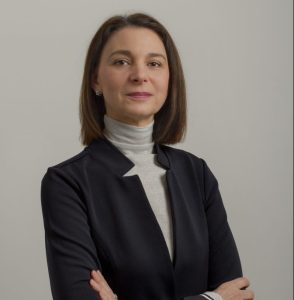 Maja Varoshlija is highly qualified and experienced working in the civil society sector, with over 20 years of experience. She holds a bachelor’s degree and Master of Art in Social work and Social Policy from the Institute of Social work and social policy, Faculty of Philosophy of the University St. Cyril and Methodius, Skopje, Macedonia. Maja possesses extensive knowledge in developing and leading programs and projects for the assistance of vulnerable persons, including victims of trafficking and sexual violence. She also has participated in major research projects and situation analyses regarding subjects of interest. Maja led the CRPM project for adaptation and implementation of the Young Man Initiative (YMI) Program, addressing gender inequalities, promoting violence prevention, healthy lifestyles among boys and girls on a national level. Throughout her career, her mission has been to assist vulnerable people and to stand for their rights by giving them a voice. She is now the Program Coordinator of Gender Budget Watchdog Network.
Maja Varoshlija is highly qualified and experienced working in the civil society sector, with over 20 years of experience. She holds a bachelor’s degree and Master of Art in Social work and Social Policy from the Institute of Social work and social policy, Faculty of Philosophy of the University St. Cyril and Methodius, Skopje, Macedonia. Maja possesses extensive knowledge in developing and leading programs and projects for the assistance of vulnerable persons, including victims of trafficking and sexual violence. She also has participated in major research projects and situation analyses regarding subjects of interest. Maja led the CRPM project for adaptation and implementation of the Young Man Initiative (YMI) Program, addressing gender inequalities, promoting violence prevention, healthy lifestyles among boys and girls on a national level. Throughout her career, her mission has been to assist vulnerable people and to stand for their rights by giving them a voice. She is now the Program Coordinator of Gender Budget Watchdog Network.

Ivana Petrisková finished her Master in European Studies at Comenius University in Bratislava, Slovakia. Most of her professional experience (+10 years) has been focused on civil society, working on youth empowerment within local and international projects (Erasmus+, European Solidarity Corps projects, Visegrad Fund and similar). Ivana was national coordinator of the international program Social Impact Award Slovakia, supporting young people to develop their start up ideas in social entrepreneurship. She is experienced in grants writing, qualitative research, capacity building and impact measurement of CSOs. As a consultant she has been cooperating with several CSOs focusing gender equality, youth and women’s education, empowerment, and employment. From June 2023 she is a Grants and Learning Officer for the Gender Budget Watchdog Network (GBWN).
 Slavica Striković has graduated with a degree from the Electro- technical faculty on University of Montenegro and holds MA on Gender Studies, from the Faculty of Humanities, University of Donja Gorica. she was part of the WNGO Women Action until its establishing, since 2000, where now she is an executive director. She is certificated trainer in: Gender Budgeting, organized by UNIFEM; Trainers and communication skills, organized by Norwegian Peoples Aid; Gender Studies, organized by Ministry of Justice, Montenegro; Citizen participation in decision making process, organized by EU; and Managing of EU projects, organized by DEU in Sarajevo. She has multiyear organizing experience in international conferences, seminars, educational meetings, public presentations of publications, magazines and documents on Gender and other issues; complex sociological and statistic researches on women’s population in Montenegro, etc. Her professional membership is consisted of:
Slavica Striković has graduated with a degree from the Electro- technical faculty on University of Montenegro and holds MA on Gender Studies, from the Faculty of Humanities, University of Donja Gorica. she was part of the WNGO Women Action until its establishing, since 2000, where now she is an executive director. She is certificated trainer in: Gender Budgeting, organized by UNIFEM; Trainers and communication skills, organized by Norwegian Peoples Aid; Gender Studies, organized by Ministry of Justice, Montenegro; Citizen participation in decision making process, organized by EU; and Managing of EU projects, organized by DEU in Sarajevo. She has multiyear organizing experience in international conferences, seminars, educational meetings, public presentations of publications, magazines and documents on Gender and other issues; complex sociological and statistic researches on women’s population in Montenegro, etc. Her professional membership is consisted of:
– 2006- 2019: President of Board for Women Enterprising within Economy Chamber of Montenegro
– 2008- still: Member of Regional Women Lobby
– 2009-2014: Member of Council of Public service Radio Television Montenegro
– 2013- still: Member of Managing board of Pedagogical Center of Montenegro
– 2015- 2019: Member of UN Women Civil Society Advisory Group for Europe and Central Asia
– 2014- 2017: Member of Commission for the allocation of a portion of the proceeds of gambling within Ministry of Finance
– 2018- 2019: Member of Commission for granting of NGOs within Ministry of Culture
 Mersiha Jaskić from Bosnia and Herzegovina is a representative of the partner organization Centar za promociju civilnog društva (CPCD). She holds a bachelor’s degree in International Relations and European Studies and a master’s degree in Security and Conflict Management. Although her primary expertise lies in security related questions and ethnic conflicts, Mersiha’s true interest is in gender related issues, gender equality, and public procurement processes. Thus, she has completed various trainings regarding gender equality, gender responsive budgeting, corruption in the public sector, and spent a trimester at Erasmus University’s International Institute for Social Studies in The Hague, studying Gender, Human Rights, and Conflict Studies: Social Justice Perspectives and is currently pursuing a master’s degree in Gender Studies. As a part of an undergraduate internship in a local whistleblowing NGO, Mersiha published a paper on the “Budget Transparency of Local Self-Administrative Units in Bosnia and Herzegovina” and offered expert services in drafting various reports on human rights, gender equality, and women’s empowerment.
Mersiha Jaskić from Bosnia and Herzegovina is a representative of the partner organization Centar za promociju civilnog društva (CPCD). She holds a bachelor’s degree in International Relations and European Studies and a master’s degree in Security and Conflict Management. Although her primary expertise lies in security related questions and ethnic conflicts, Mersiha’s true interest is in gender related issues, gender equality, and public procurement processes. Thus, she has completed various trainings regarding gender equality, gender responsive budgeting, corruption in the public sector, and spent a trimester at Erasmus University’s International Institute for Social Studies in The Hague, studying Gender, Human Rights, and Conflict Studies: Social Justice Perspectives and is currently pursuing a master’s degree in Gender Studies. As a part of an undergraduate internship in a local whistleblowing NGO, Mersiha published a paper on the “Budget Transparency of Local Self-Administrative Units in Bosnia and Herzegovina” and offered expert services in drafting various reports on human rights, gender equality, and women’s empowerment.
 Dragana Srećkov, representing the partner organization Gender Knowledge Hub from Serbia, Dragana emerges as a seasoned professional with a rich 13-year tenure as a project manager in both the public and civil sectors. Throughout her career, she has spearheaded projects financed by the European Commission, showcasing her adeptness in navigating complex initiatives. Dragana holds a bachelor’s degree in the Theory of Culture and Media and brings a solid academic foundation to her professional endeavours. Beyond her managerial role, Dragana has proven herself as a skilled trainer, facilitating basic and advanced-level workshops and educational activities. Her expertise extends to transferring crucial know-how for programs such as the Creative Europe program and other initiatives under the European Commission. With a multifaceted approach, Dragana underscores her commitment to advancing cultural initiatives, building capacities, and fostering collaboration within the dynamic landscape of the creative sector. Her diverse skill set positions her as a valuable asset in shaping and contributing to Serbia’s cultural and project management landscape.
Dragana Srećkov, representing the partner organization Gender Knowledge Hub from Serbia, Dragana emerges as a seasoned professional with a rich 13-year tenure as a project manager in both the public and civil sectors. Throughout her career, she has spearheaded projects financed by the European Commission, showcasing her adeptness in navigating complex initiatives. Dragana holds a bachelor’s degree in the Theory of Culture and Media and brings a solid academic foundation to her professional endeavours. Beyond her managerial role, Dragana has proven herself as a skilled trainer, facilitating basic and advanced-level workshops and educational activities. Her expertise extends to transferring crucial know-how for programs such as the Creative Europe program and other initiatives under the European Commission. With a multifaceted approach, Dragana underscores her commitment to advancing cultural initiatives, building capacities, and fostering collaboration within the dynamic landscape of the creative sector. Her diverse skill set positions her as a valuable asset in shaping and contributing to Serbia’s cultural and project management landscape.
 Alexandru Gribincea is a representative of the partner organization Keystone Moldova. He is currently a PhD student in the field of World Economy: International Economic Relations. Throughout his doctoral studies, he authored more than 25 scientific articles in the field of economics. Has completed two higher education degrees, one in economics and another in law. He holded the position of University Lecturer in Economics and College Teacher in Economics. He also was a Trainee Lawyer specializing in business and civil rights. He has participated in various training programs focused on gender equality and gender-responsive budgeting. Alexandru has also taken part in international mobility programs, spending a semester at Universidad de Cadiz in Spain during his doctoral studies and engaging in another Erasmus mobility program at Universitatea Danubius in Galați, Romania, during his master’s degree studies.
Alexandru Gribincea is a representative of the partner organization Keystone Moldova. He is currently a PhD student in the field of World Economy: International Economic Relations. Throughout his doctoral studies, he authored more than 25 scientific articles in the field of economics. Has completed two higher education degrees, one in economics and another in law. He holded the position of University Lecturer in Economics and College Teacher in Economics. He also was a Trainee Lawyer specializing in business and civil rights. He has participated in various training programs focused on gender equality and gender-responsive budgeting. Alexandru has also taken part in international mobility programs, spending a semester at Universidad de Cadiz in Spain during his doctoral studies and engaging in another Erasmus mobility program at Universitatea Danubius in Galați, Romania, during his master’s degree studies.
Elirjeta Beka has finished her master’s degree in Management, Business, and Economics at UBT College, and her thesis is titled ‘The Importance of the Economics of Well-Being: Analysis of Economic Indicators and Happiness in Economic Growth (Case Study: Western Balkans).’ In 2023, she started a second degree in Balkanistic Studies at the University of Prishtina. She has worked in higher education in Kosovo at UBT College and Riinvest College in the timeframe 2019-2022, where she had the chance to coordinate various faculty programs, including the research program. She was also a teaching assistant for the course Introduction to Financial Management. She has published and contributed to several research papers related to economics, human rights, peacebuilding and gender, and has worked as an outside expert for different research companies. She is an alumna of the Regional Youth Partnership, a program created to bring together the youth of Bosnia and Herzegovina, Kosovo and Serbia in peacebuilding activities. She is also a trainer for peacebuilding. She started to work at Kosovo Women’s Network (KWN) in 2023, where she is a coordinator for Gender-Responsive Budgeting. She has collected and analyzed gender-disaggregated data from relevant institutions in Kosovo and mentored public officials in GRB, including mainstreaming gender in public policies.
 Kristian Lika is the Project Coordinator from Albania representing Gender Alliance for Development Center starting from 2022. His educational background includes a bachelor’s degree in Sociology from the University of Tirana and a graduate degree in Political Science and International Relations from EPOKA University. With professional affiliations in academia, international organizations, and civil society organizations (CSOs), Kristian brings a wealth of expertise to the table. His professional focus involves effectively coordinating and organizing events and activities for project teams. Through this experience, Kristian has honed his project management skills, demonstrating proficiency in activity planning, adherence to timelines and budgets, and successful delivery of outputs that align with project objectives and stakeholder expectations.
Kristian Lika is the Project Coordinator from Albania representing Gender Alliance for Development Center starting from 2022. His educational background includes a bachelor’s degree in Sociology from the University of Tirana and a graduate degree in Political Science and International Relations from EPOKA University. With professional affiliations in academia, international organizations, and civil society organizations (CSOs), Kristian brings a wealth of expertise to the table. His professional focus involves effectively coordinating and organizing events and activities for project teams. Through this experience, Kristian has honed his project management skills, demonstrating proficiency in activity planning, adherence to timelines and budgets, and successful delivery of outputs that align with project objectives and stakeholder expectations.
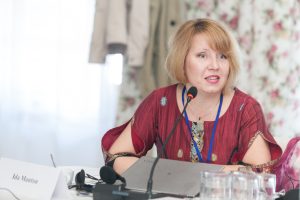 Ida Manton is an expert with extensive experience as a trainer, scholar and practitioner in the field of international relations and diplomacy, with focus on negotiations, mediation and conflict resolution. She is a member of PIN’s POINT, Senior Negotiations and Conflict Resolution Advisor for PACE Global Strategies (USA) and Just Access (Germany), visiting professor at VŠE Prague (Czech Republic), Steering Committee member of the OSCE Academic Network representing the Geneva-based Diplomacy Dialogue, mentor for GLOBSEC’s CEEHER initiative and a mother of two daughters. She has an MA from Leiden University and Clingendael, in International Relations and Diplomacy. Her professional engagement includes work for International Organizations (both at HQ and field operations level), NGOs, Universities, Diplomatic Academies, Academic institutes and Think tanks. She has trained diplomats (OSCE, EU, government officials), business people, military staff (NATO Defense College, ESDC, CASD) and students, in topics connected to international negotiation processes, mediation and conflict resolution. She has conducted trainings for various Diplomatic Academies, Institutes , Organizations/Alliances/Unions (OSCE, EU, NATO, ICMPD) and Universities throughout Europe and Central Asia. She was in capacity-building teams preparing the civil servants for EU Presidencies (Malta, Romania and Croatia). She has published articles, book chapters, presented at international conferences and has written policy briefs, reference guides (including on Peacebuilding for the OSCE) and negotiation simulations. She provides the training in the art of advocacy for the network.
Ida Manton is an expert with extensive experience as a trainer, scholar and practitioner in the field of international relations and diplomacy, with focus on negotiations, mediation and conflict resolution. She is a member of PIN’s POINT, Senior Negotiations and Conflict Resolution Advisor for PACE Global Strategies (USA) and Just Access (Germany), visiting professor at VŠE Prague (Czech Republic), Steering Committee member of the OSCE Academic Network representing the Geneva-based Diplomacy Dialogue, mentor for GLOBSEC’s CEEHER initiative and a mother of two daughters. She has an MA from Leiden University and Clingendael, in International Relations and Diplomacy. Her professional engagement includes work for International Organizations (both at HQ and field operations level), NGOs, Universities, Diplomatic Academies, Academic institutes and Think tanks. She has trained diplomats (OSCE, EU, government officials), business people, military staff (NATO Defense College, ESDC, CASD) and students, in topics connected to international negotiation processes, mediation and conflict resolution. She has conducted trainings for various Diplomatic Academies, Institutes , Organizations/Alliances/Unions (OSCE, EU, NATO, ICMPD) and Universities throughout Europe and Central Asia. She was in capacity-building teams preparing the civil servants for EU Presidencies (Malta, Romania and Croatia). She has published articles, book chapters, presented at international conferences and has written policy briefs, reference guides (including on Peacebuilding for the OSCE) and negotiation simulations. She provides the training in the art of advocacy for the network. Marija Vukovic is full-time professor at the Novi Sad Business School of Gender Responsive Budgeting and Public finance, Gender Budgeting Consultant and Tax policy consultant (Director of agency for accounting and taxation “TaxIT”). Main fields of expertise: feminist economics, accounting, budgeting, public finance, women’s rights, national and European economics, public finance, taxation, inequality. Specific expertise: gender equality, gender mainstreaming, gender and development, gender programming, gender analysis, introducing gender indicators, sustainable development goals.
Marija Vukovic is full-time professor at the Novi Sad Business School of Gender Responsive Budgeting and Public finance, Gender Budgeting Consultant and Tax policy consultant (Director of agency for accounting and taxation “TaxIT”). Main fields of expertise: feminist economics, accounting, budgeting, public finance, women’s rights, national and European economics, public finance, taxation, inequality. Specific expertise: gender equality, gender mainstreaming, gender and development, gender programming, gender analysis, introducing gender indicators, sustainable development goals.
 Riste Jurukovski holds a Master’s degree in Economics. With more than 13 years of professional experience in the public, business and civic sectors, Jurukovski is specialized in public policy analysis and regulatory impact assessment, as well as feasibility studies. He has a thorough knowledge on GRB, and covers modules related to budget execution, as well as gender revenue and expenditure planning from gender perspective.
Riste Jurukovski holds a Master’s degree in Economics. With more than 13 years of professional experience in the public, business and civic sectors, Jurukovski is specialized in public policy analysis and regulatory impact assessment, as well as feasibility studies. He has a thorough knowledge on GRB, and covers modules related to budget execution, as well as gender revenue and expenditure planning from gender perspective.
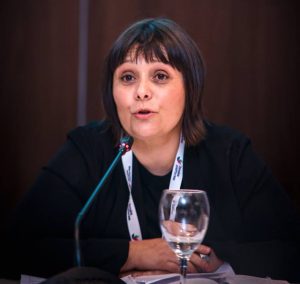 Zorana Antonijević holds a PhD in Gender Studies from the University of Novi Sad. At the core of her research interests are gendered institutions, gender in care and security policies, critical studies on men and masculinities and their application to the post-conflict, transitional context. For over twenty years, Zorana has been a gender equality consultant for various international, regional and national organisations and institutions. She is a research fellow at the Centre for International Security, Faculty of Political Science, University of Belgrade and an associate member of the Gender Equality Board of the University of Novi Sad. She is active in the women’s movement, especially against anti-gender projects in the Balkans.
Zorana Antonijević holds a PhD in Gender Studies from the University of Novi Sad. At the core of her research interests are gendered institutions, gender in care and security policies, critical studies on men and masculinities and their application to the post-conflict, transitional context. For over twenty years, Zorana has been a gender equality consultant for various international, regional and national organisations and institutions. She is a research fellow at the Centre for International Security, Faculty of Political Science, University of Belgrade and an associate member of the Gender Equality Board of the University of Novi Sad. She is active in the women’s movement, especially against anti-gender projects in the Balkans.
 Natalia Vozian is an experienced and multilingual Public Policy and Gender Consultant. In the last 9 years, she has worked across multiple projects and gender equality consultancy areas, including EVAW, GRB and GM in leading global companies and UN organizations. With EMBA from University of Sheffield and certification from INSEAD, International Gender Diversity Program, she has delivered more than 25 national and global mid to complex scale projects and have supported Governments to draft and implement strategic public policies, services and budgets for achieving socio-economic sustainability and gender equality. As part of her professional activity, Natalia has co-developed National Strategy on Ensuring Gender Equality between Men and Women in Republic for Moldova, area GRB and EVAW and the first National Strategy in Preventing and Combating Violence against women and children. She has a supported Ministry of Finance and Ministry of Labor in implementing GRB at the national level. As well she has contributed to building and strengthening the GRB expertise among local NGOs and have co-created the Regional GRB Watchdog Network (Albania, Serbia, Macedonia and Moldova). She is the author of several guides on application of social innovation in EVAW and migration. She has co-author of a gender equality guide for young people and community at general. She has extensive knowledge and experience in using gender analysis and gender mainstreaming in different socio-economic areas, including: migration, labor, children protection. Working with people from different cultures and regions, she has extensive practice in collaborating and communicating with virtual, on site and matrix structured teams and stakeholders, seeking always to find win-win solutions. She is passionate about user experience, social innovation, design thinking, human and women rights, mentoring. and has received the UN Human Rights Award for Civic Activism.
Natalia Vozian is an experienced and multilingual Public Policy and Gender Consultant. In the last 9 years, she has worked across multiple projects and gender equality consultancy areas, including EVAW, GRB and GM in leading global companies and UN organizations. With EMBA from University of Sheffield and certification from INSEAD, International Gender Diversity Program, she has delivered more than 25 national and global mid to complex scale projects and have supported Governments to draft and implement strategic public policies, services and budgets for achieving socio-economic sustainability and gender equality. As part of her professional activity, Natalia has co-developed National Strategy on Ensuring Gender Equality between Men and Women in Republic for Moldova, area GRB and EVAW and the first National Strategy in Preventing and Combating Violence against women and children. She has a supported Ministry of Finance and Ministry of Labor in implementing GRB at the national level. As well she has contributed to building and strengthening the GRB expertise among local NGOs and have co-created the Regional GRB Watchdog Network (Albania, Serbia, Macedonia and Moldova). She is the author of several guides on application of social innovation in EVAW and migration. She has co-author of a gender equality guide for young people and community at general. She has extensive knowledge and experience in using gender analysis and gender mainstreaming in different socio-economic areas, including: migration, labor, children protection. Working with people from different cultures and regions, she has extensive practice in collaborating and communicating with virtual, on site and matrix structured teams and stakeholders, seeking always to find win-win solutions. She is passionate about user experience, social innovation, design thinking, human and women rights, mentoring. and has received the UN Human Rights Award for Civic Activism.
Subscribe to our newsletter to receive updates, news, and insights about our work in gender equality
Center for Research and Policy Making – Network for Gender Responsive Budgeting
With funding from
